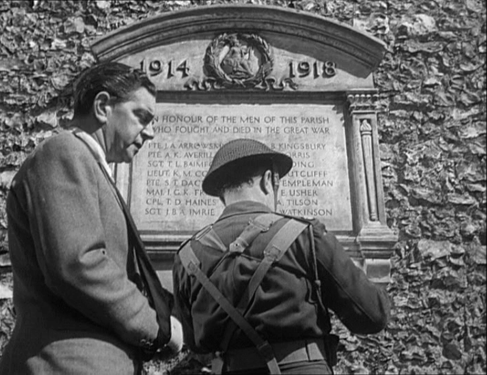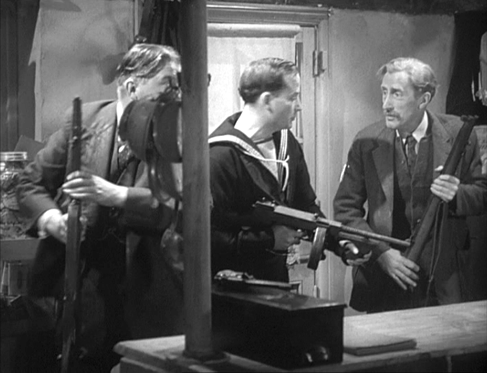Cavalcanti + Ealing = a little-known gem
Wednesday | May 7, 2008 open printable version
open printable version
Went the Day Well? A traitor gives information to a German infiltrator, who takes notes against a memorial to World War I dead
Kristin here—
As David and I sit here revising our Film History textbook for its third edition, we’re looking forward to the annual Il Cinema Ritrovato film festival in Bologna (June 28-July 5). We blogged from there last year and plan to do so again this year.
One of the festival’s themes in recent years has been World War II. Last year the program included Alberto Cavalcanti’s Went the Day Well?, which he directed for Ealing Studios in 1942. Partly out of a sense of duty, since I cover Great Britain for the textbook, I went to the screening. It turned out to be a well-made, engaging, and surprisingly affecting film.
Alberto De-Almeida Cavalcanti
Alberto Cavalcanti is one of those names that people who take courses in film tend to be vaguely aware of, and that for only a handful of titles. He got his start as a set designer on Marcel L’Herbier’s L’Inhumaine (1923). His first film as a director, the 1926 experimental city symphony Rien que les heures, is a minor classic of the era. Coal Face (1935) is one of the better known British documentaries of the 1930s. Cavalcanti worked for Ealing for several years in the 1940s, and a modern cinema buff is likely to know his two episodes of the collectively directed Dead of Night (1945), including “The Ventriloquist’s Dummy,” the most highly regarded of the batch. Devotees of Ealing or of classic British comedy will also be familiar with his Champagne Charlie (1944). His other best-known films are Nicholas Nickleby and They Made Me a Fugitive (both 1947).
In an era of globilization, Cavalcanti’s career looks positively modern. Born in Rio De Janeiro, he made his early films in Paris. He worked in British documentaries during the 1930s before moving to Ealing, and he remained in England throughout the 1940s. The rest of Cavalcanti’s filmmaking career saw him on the move, including projects in East Germany, Israel, and Brazil. He had a brief stint in TV in the early 1970s before he retired. He died in Paris in 1982. He tended to sign his films simply “Cavalcanti,” as is the case on Went the Day Well?
British Pluck
Based on Graham Greene’s short story, “The Lieutenant Died Last,” Went the Day Well? is a “what if?” tale. A group of Germans disguised as British soldiers deceive a small village’s citizens into letting them billet there and conduct practice exercises. In reality they are there to set up observation posts in preparation for an invasion.
When the film was being planned, there were many rumors in England that a German invasion was imminent and much speculation as to whether the country could resist such a thing successfully. The film has no doubts. In fact, its brief frame story is set in 1945, and the narrator, one of the inhabitants of the fictional village Bramley End, reveals that Germany has been defeated. The narrator shows us the grave of several German soldiers who died in the attempted infiltration.
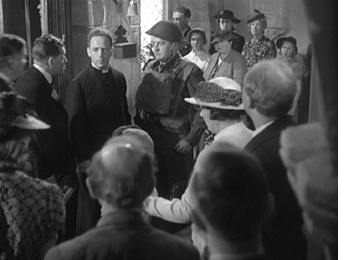 From the start, then, the spectator is aware that the apparent British soldiers who arrive in Bramley End are disguised Germans and that they will be defeated. This seems like an odd tactic, letting us know so much, and yet it makes perfect sense. The point of the early part of the film is to introduce us to the villagers who will form the collective hero of the plot. Seeing them going about helping British soldiers settle into the local hall and various households would hardly be dramatic. As it is, knowing more than they do, we are in suspense as to whether and how they will discover the truth and react.
From the start, then, the spectator is aware that the apparent British soldiers who arrive in Bramley End are disguised Germans and that they will be defeated. This seems like an odd tactic, letting us know so much, and yet it makes perfect sense. The point of the early part of the film is to introduce us to the villagers who will form the collective hero of the plot. Seeing them going about helping British soldiers settle into the local hall and various households would hardly be dramatic. As it is, knowing more than they do, we are in suspense as to whether and how they will discover the truth and react.
At first they seem the conventional characters of a comedy or light drama—the sorts who would be the supporting roles in a Hitchcock film like The Lady Vanishes. They innocently cooperate in typical British fashion, giving directions and offering tea and spare bedrooms. The initial third or so of the film is pleasant in tone, despite our underlying awareness of the enemy being let into these people’s midst.
Yet the little scenes of ordinary life swiftly and subtly set up the traits in these people that will allow them to fight back later. The local shopkeeper and telephone operator may be a bit dotty and forgetful, but she also bridles when one of 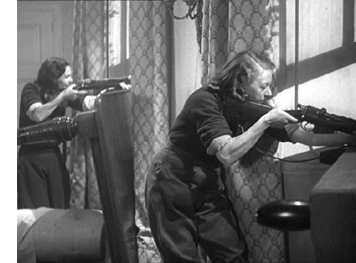 the Germans manhandles a boy who had been snooping around the equipment in the soldiers’ truck. In the same scene, that boy is established as spunky and curious. Went the Day Well? manages to set up several major characters that we come to care about, as well as many recognizable supporting figures. There is no one protagonist. In fact, the film’s top-billed actor, Leslie Banks (familiar to modern audiences mainly from The Most Dangerous Game, the original Man Who Knew Too Much, and Henry V), is a traitor, secretly aiding the Germans. That’s Banks in the photo surmounting this entry.
the Germans manhandles a boy who had been snooping around the equipment in the soldiers’ truck. In the same scene, that boy is established as spunky and curious. Went the Day Well? manages to set up several major characters that we come to care about, as well as many recognizable supporting figures. There is no one protagonist. In fact, the film’s top-billed actor, Leslie Banks (familiar to modern audiences mainly from The Most Dangerous Game, the original Man Who Knew Too Much, and Henry V), is a traitor, secretly aiding the Germans. That’s Banks in the photo surmounting this entry.
Naturally once the villagers discover who their guests really are, they come through with English pluck and resourcefulness–the women as well as the men. The film doesn’t sugar-coat the conflict, though. A number of characters one would not conventionally expect to die do meet heroic ends, and the tone rapidly turns more serious roughly halfway through the action.
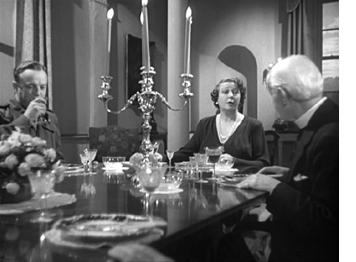 Went the Day Well? is a handsome film, too. British films of the 1930s sometimes look like low-budget Hollywood imitations, but by the 1940s the studios had more resources. Cavalcanti’s design sense serves him well, and the beautifully lit scenes and crisp editing look like something MGM could have been proud of. William Walton contributes a brief but suitably grand score.
Went the Day Well? is a handsome film, too. British films of the 1930s sometimes look like low-budget Hollywood imitations, but by the 1940s the studios had more resources. Cavalcanti’s design sense serves him well, and the beautifully lit scenes and crisp editing look like something MGM could have been proud of. William Walton contributes a brief but suitably grand score.
Sources
Unfortunately Cavalcanti’s films aren’t easily available on DVD in the U.S. The only current way to buy Went the Day Well? on region 1 DVD is as part of a set, the “British War Collection.” (The set was originally released as individual discs as well, and several copies of that edition of Went the Day Well? are offered on eBay.) Amazingly, the only other in-print films are Le Capitaine Fracasse (a re-discovered 1929 French film with a young Charles Boyer, co-directed by Cavalcanti), Nicholas Nickleby, and They Made Me a Fugitive.
Those with multi-region players can visit Amazon.uk, where one can find Went the Day Well?, the three films just listed, Dead of Night, and Champagne Charlie.
Went the Day Well? seems like the kind of film ripe for a Criterion edition, if we may drop a hint in their ear.
Added May 11:
David Cairns, director and scriptwriter, critic and blogger, and Cavalcanti fan has responded to this entry with one of his own, discussing other aspects of Went the Day Well? (Beware, his entry has more SPOILERS than mine.) As he rightly points out, the early portions of the film not only set up the bucolic village and its apparently conventional British country folk, but they provide an object lesson for citizens not to behave in such a naive and unquestioning fashion. Germans might be anywhere! I was mainly writing about the narrative conventions that would hold for a modern audience watching a decades-old classic. There’s no doubt, though, that for a contemporary audience there would have been that implication. The point is fairly explicitly made when one character finally finds a clue that makes her begin to suspect something is wrong, while another dismisses her ideas–with we all the while knowing that the woman who becomes suspicious is right.
I don’t think I buy another claim David makes about a subtext for the film: “the film becomes more subversive. According to Cavalcanti, a pacifist, his objective was to show that when war comes to even a place as charming as Bramley End, the people become monsters. Without the slightest change in underlying personality, peace-loving and jocular countryfolk pick up weapons and set about slaughtering their fellow humans.”
I don’t find the villagers in any way to be monsters, even in their most violent acts against the invaders. For one thing, it’s self-defense in wartime. The starkly violent scene of the Germans ambushing and mowing down a group of men from the Home Guard makes that clear from before the point when the villagers respond. I certainly can’t believe that the audiences of 1942 would have seen the villagers as descending into some primitively violent instincts. After all, this film came out only a little over a year after the end of the Blitz. In fact, the Germans had attempted to infiltrate England in preparation for the Battle of Britain, which in turn was to culminate in a land invasion. All infiltration attempts were thwarted, and poor intelligence was a major contributing factor to what became Germany’s first significant loss of the war. There would have been few people in Britain who could conceive of pacifism as a response to what they had recently lived through.
For another thing, the villagers don’t kill ruthlessly. All three women who kill someone pause afterward, clearly upset and even nauseated . The men are more blithe about it, but they’re seldom seen killing except in pitched battles, and just as often the village menfolk are the victims up until the rescuing soldiers arrive at the end. I’d argue that the characters’ underlying personalities are assumed to include the courage and determination that surface in time of need.
Thanks to David for his thought-provoking comments and for backing me up in urging that cinephiles should seek out this and other Cavalcanti films. He mentions They Made Me a Fugitive in particular.
DVD reviewer Slarek has reviewed Went the Day Well? on DVD Outsider. (Again, SPOILERS.) Among other interesting comments, he reveals that it was shot in Turville, Oxfordshire. I think Bramley End is probably supposed to lie in the south of England, where most of the German aircraft and the putative invasion would have entered the country. Still, the rolling landscapes and hedgerow-lined fields of Kent and Sussex are fairly similar to those of Oxfordshire. As Slarek proves with a photo, the village is not all that much changed today.












